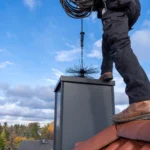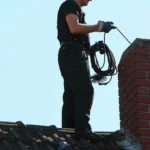To prevent chimney fires, the Chimney Sweep Institute of America (CSIA) and the National Fire Protection Association (NFPA) recommend an annual chimney inspection. A chimney inspection is a process of analyzing your chimney’s condition for any potential hazards. If you are looking for a chimney inspections near me, choose a certified chimney inspection service to ensure that your chimneys are working properly and your life is not at risk due to any damage or defect in the chimney.
Don’t risk your safety: the importance of certified chimney inspections
Chimney inspections are often overlooked but essential for a house’s safety and the lives living inside. It is critical to maintain the efficiency of a heating system in a house such as chimneys or fireplaces. That is why opting for certified chimney inspections near me is reliable and safe for you.
-
Uncover Health & Safety Risks
Chimneys are not just a source of ventilation for your house, but they also protect you from many unseen dangers, which include carbon monoxide poisoning, Creosote Buildup, Flue Obstructions, and Masonry Damage. Look for Chimney inspections and cleaning services near me that can help in the detection of these issues that could be silent killers for you.
-
Revealing structural problems
Annual chimney inspection helps you to have a look at a hidden structural problem. These problems can put your safety at risk. During inspection, professionals can inspect structural problems that are not normally visible, such as cracks or deteriorating mortar joints.
-
Identify Flue changes
A flue or a chimney liner is an exit or pathway for exhaust gases. Annual chimney inspections can identify flue changes and prevent you from hazardous danger. Take services from chimney inspections near me.
-
Preventing Debris Accumulation
Leaves, twigs, creosote buildup, or other forms of debris are important reasons to prioritize regular chimney cleanings or inspections. Creosote is a highly inflammable substance produced by burning wood, Inspection can prevent you from the hazardous effects of creosote
Chimney inspection: Determining the right level
The National Fire Protection Association (NFPA) has divided the certified chimney inspection procedure into 3 levels. Level 1 is considered the basic level, whereas levels 2 and 3 are the more detailed and comprehensive levels.
-
Level 1 inspection
This step is performed during the chimney cleaning as this is the basic level and inspection of visible areas such as the exterior, cap, and flue liner.
-
Level 2 inspection
This is an upgraded level of inspection in which we use a video camera to inspect the flue liners. Level 2 does not require any removal of permanent parts of the building, such as siding, chase covers, or wall coverings. This is a more detailed and thorough inspection than level 1.
-
Level 3 inspection
Level 3 inspection is an expensive and extremely detailed chimney inspection that involves the removal of permanent parts of the building. This is usually done to reach the hidden areas.
Chimney Inspection: Warning signs you shouldn’t ignore
NFPA has made it clear that chimney inspections are necessary for a safe housing system. To ensure the safety of your house, it is crucial to promptly respond to the following signs that need proper professional inspection
- Unusual Odors
- Visible Damage
- Difficulty with Fires
- Damper Issues
- Unusual Noises
- Soot Buildup
- Structural Issues
Reliable chimney inspections and cleaning: What to look for
Annual or yearly reliable chimney inspections can protect your home from fire and damage. The following are the key aspects that ensure reliable inspection.
-
CSIA Certified Chimney Sweeps
Chimney inspection through CSIA-certified chimney sweeps is essential to prevent fire and reliability. Professionals from CSIA-certified companies are trained to identify the chimney damaging issues such as accumulation of creosote and identification of hidden issues.
-
Structural Assessment
Structural assessments are important to prevent hazardous chimney effects. By prioritizing chimney inspections, homeowners can significantly reduce the risk of fires and other safety hazards while ensuring the durability and safety of chimneys or fireplaces.
-
Cleaning Recommendations
Regular chimney cleaning and inspection are necessary for the longevity and safety of a home. Before the heating season, professionals recommend chimney cleaning because accumulation of creosote, or any other debris can cause serious damage.
-
Preventing Water Damage
Preventing your chimneys from water damage is also necessary. It shows up in the form of algae or molds on the chimney bricks or exterior walls. It can cause rusting on the flue lining, which can be quite dangerous.
Chimney Inspections vs. Cleanings: What’s the Difference and When to Schedule Them
- Chimney inspection and chimney cleaning are quite opposite to each other, but they both serve the same purpose, as they prevent your chimney from damage.
- Inspection is used to assess the structural integrity of the chimney and to identify potential hazards. It is done at least once a year, usually before the start of the heating season.
- Chimney cleaning involves the removal of buildup and any debris inside the chimney. It is done more than once a year, particularly depending on the usage of chimneys or the burning of wood.
Conclusion
For the safety and protection of your space, it is crucial to get your chimney inspected and cleaned. On-time identification of chimney issues can prevent you from hazardous danger. Getting your chimney inspection from CSIA-certified companies can prevent you from future damage. Don’t put your home and family safety at risk. Contact certified chimney inspections and cleaning near me today!
FAQs
How often should I get a chimney inspection and cleaning?
According to NFPA, before the heating season chimney inspection should be done at least once a year, and chimney cleaning could be done more than once a year, depending on the extent of burning wood.
Is there any safety tip for the chimney?
Yes, you can use chimney caps and proper clearance of ash after burning wood.
How do I find qualified chimney inspections and cleaning near me?
You can use CSIA and NFPA-certified chimney inspection companies, and you can also take any trusted referral, or you can search on web for chimney inspections and cleaning near me.
How much does chimney inspection cost?
It depends on the level of inspection you are getting. Level 1 is the least expensive one, and level is the most expensive one.
Is it beneficial to get stainless steel liners in my chimney?
Yes, steel liners, especially stainless steel liner,s are important in chimneys because they provide safety, efficiency, and longevity.




